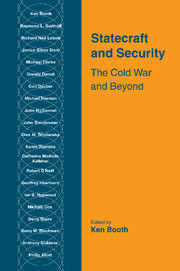Book contents
- Frontmatter
- Contents
- List of contributors
- Preface
- Introduction
- Part one Cold War: lessons and legacies
- Part two Post-Cold War: powers and policies
- Part three Beyond: resistances and reinventions
- 14 International peace and security in the twenty-first century
- 15 Affluence, poverty and the idea of a post-scarcity society
- 16 The future of the human past
- Conclusion: security within global transformation?
- Index
15 - Affluence, poverty and the idea of a post-scarcity society
Published online by Cambridge University Press: 06 October 2009
- Frontmatter
- Contents
- List of contributors
- Preface
- Introduction
- Part one Cold War: lessons and legacies
- Part two Post-Cold War: powers and policies
- Part three Beyond: resistances and reinventions
- 14 International peace and security in the twenty-first century
- 15 Affluence, poverty and the idea of a post-scarcity society
- 16 The future of the human past
- Conclusion: security within global transformation?
- Index
Summary
My starting point in this discussion is a world that has taken us by surprise. By ‘us’ I mean not only observing intellectuals and practical policymakers, but the ordinary individual too. In the West at least we are all the legatees of certain strands of Enlightenment thought. The Enlightenment was a complex affair. Various different perspectives of thought were bound up with it and the works of the leading Enlightenment philosophers were often complex and subtle. Yet in general the philosophers of Enlightenment set themselves against tradition, against prejudice and against obscurantism. For them the rise of science, both natural and social, would disclose the reality of things.
Understanding was always itself understood as an unfinished and partial affair – the expansion of knowledge is at the same time an awareness of ignorance, of everything that is not and perhaps will not be known. Nevertheless, knowledge was presumed to be cumulative and presumed also to yield a progressive mastery of the surrounding world. The more we are able to understand ourselves, our own history and the domain of nature, the more we will be able to master them for our own purposes and in our own interests. The underlying theorem, stripped bare, was extremely plausible. The progress of well-founded knowledge is more or less the same as the progressive expansion of human dominion (Giddens, 1990).
Marx brought this view its clearest expression, integrating it with an interpretation of the overall thrust of history itself.
- Type
- Chapter
- Information
- Statecraft and SecurityThe Cold War and Beyond, pp. 308 - 322Publisher: Cambridge University PressPrint publication year: 1998
- 2
- Cited by



